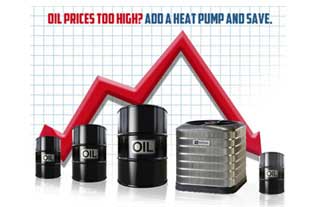 With heat accounting for 60 percent of energy use in home it’s important for homeowners to decipher their most economical options. While there are a number of ways to heat a house, the right way generally boils down to budget and home design.
With heat accounting for 60 percent of energy use in home it’s important for homeowners to decipher their most economical options. While there are a number of ways to heat a house, the right way generally boils down to budget and home design.
Home Design:
Houses built prior to the 1950's typically had hydronic systems. Radiators, copper piping and a large cast iron boilers supplied and distributed hot water throughout these homes in a very inefficient manner. Newer homes constructed after the 1950's commonly used forced hot air systems also known as furnaces. These systems distributed heat through ducts which are concealed within the walls, ceilings and floors.
The Budget:
For either of the above mentioned home styles a gas furnace is the most economical choice for replacement, specifically a higher efficiency one. Why? Initial investment is low and natural gas fuel is expected to be stable for the next 10 years.
The Savings:
The real savings come in to play when an air-source heat pump is installed. While you get a dollar of heat out of every dollar of energy in a baseboard system. You get four dollars of heat out of every dollar of energy when heating in heat pump mode. A heat pumps only energy requirement is the electric pumps which run coolant through the refrigerant lines. Yes that's right I said refrigerant lines, a heat pump is merely an air conditioner running in reverse. What does that all mean for you the homeowner? It means you get efficient heat in the winter and COOLING in the summer, it’s a win-win scenario.
Things to Know:
Keep in mind a heat pump installation is only effective down to the zero degree mark. That means you will require an emergency heat system either a furnace or a boiler. Your emergency heat will automatically take over when it is no longer efficient to heat via heat pump.
Why Not Geothermal?
Geothermal technology is great! But it is not yet viable for the general public. Pay-off for a geothermal system is 10-12 years and those numbers are calculated using a house with an annual fuel bill of $5000, the pay-off being much longer with a smaller home. Homeowners can also expect a $1500 dollar utility increase for electricity. So what's an air-source heat pumps pay-off, about two years if you’re already in the market for A/C, double that if you’re not.
